
 |
MGTD06 |
| Marketing in the Information Age | |
| 4rth year course in the Division of Management, University of Toronto at Scarborough, Canada |
This page last changed
2004 Sep 30
SECTION on
Dot . com failures
Privacy and legal issues
e-commerce regulations and
new laws
Mobile and wireless e-commerce
.
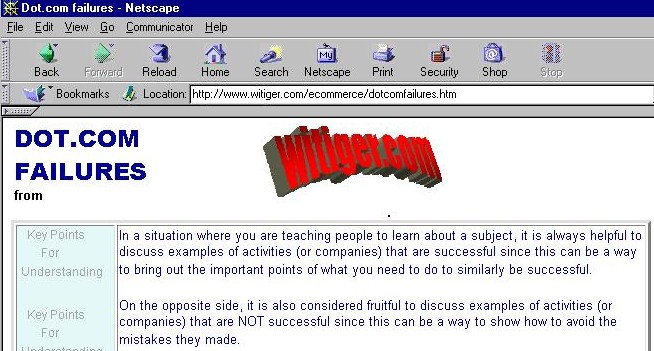
| E-commerce
Law and Regulations Text
E-commerce
Text
E-commerce
|
|
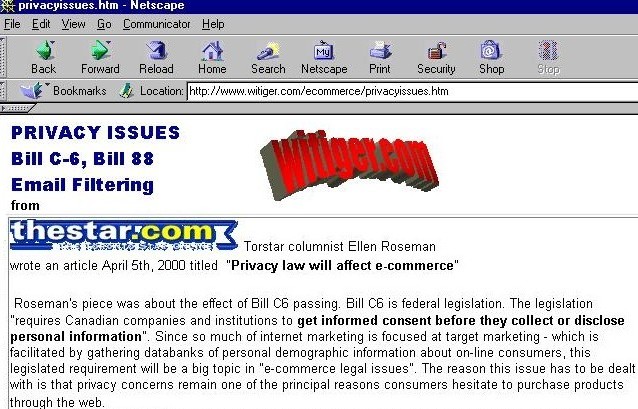
.
| E-commerce
Law and Regulations 
E-commerce Law and Regulations |

The E-commerce Project is a not-for-profit initiative. It is jointly sponsored by America Online, Inc., the Institute for Information, Telecommunications and Media Law at the University of Muenster, The International Bar Association, The Computer Law Association, The Internet Law and Policy Forum and the Interactive Services Association. Its content is being updated by a network of "National Reporters,",who are members of one or more of the sponsoring organizations and who volunteer to report on current developments and events in their respective home countries. They include lawyers, professors and other professionals, who are experts on specific e-commerce related topics. The
E-commerce Project should be a reference source for IEC 719 - it has links
to current articles on the many different categories of E-com Law
adult content access 
This Vancouver based law firm has a good web page which includes a very useful check list of questions you should ask yourself about a web site you are working on. They call it "Legal Audit for Web Sites" and you can access the list for free at http://www.dunn.com/papers/audit.htm [when we checked again Nov 2000, this audit page was not at this location] |
| E-commerce
Law and Regulations |
Professor
Michael Rappa's web page on Intellectual Property
http://ecommerce.ncsu.edu/topics/ip/ip.html includes links to articles
such as
"A consumer today is likely
to discover numerous competitive Internet Web sites offering the same or
similar information, products or services. To succeed in this competitive
e-commerce market, a business must attract as many consumers as possible
to its Web site, while building and retaining consumer loyalty. Sometimes,
a Web site is more attractive to consumers because it is built with cutting
edge technology that provides advanced audio/visual user interfaces, services
and security measures. E-commerce proprietors have recognized that a competitive
advantage may be gained by securing patent protection for such technological
innovations."
Also linked off Prof. Rappa's web site is 
BitLaw covers the legal issues of:
|
|
Jurisdictional Issues
|
One of the biggest challenges
in Internet legal issues is the matter of jurisdiction.
If you are speeding in New York City, you can be pulled over by the New York City Police. If you are speeding on a highway between metro areas, you can be arrested by New York State Troopers. If you commit a crime that involves travelling between states, you can be arrested by the FBI. If you commit a crime that is outside the jurisdiction of any particular countries - you will not be arrested since the law can only be enforced when their is an agency that has jurisdiction.

In August 2000 there was a case involving Yahoo which saw Yahoo being ordered by the French government to block access to sites auctioning Nazi memorabilia. In France, it is against the law for such things to be sold since it comes under the category of their anti-racism and hate crimes legislation. While "www.yahoo.fr" does not carry links to such Nazi sites, it is possible for people to go onther Yahoo sites and find Nazi auctions. Yahoo pleaded that it was technologically impossible to block people accessing such sites but the French government did not agree and took Yahoo to court. As of August 12, 2000, the French judge hearing the case had not yet called for Yahoo to be fined for failing to comply and was delaying his ruling. The most interesting point
coming out of the trial was the judge's "rejecting Yahoo's argument that
French courts did not have the power to impose French law ... when French
people tapped in to Yahoo's English language portal"
Update 2001
"A federal [United States] judge said Wednesday [Nov 2001] that Yahoo! (Nasdaq: YHOO) is protected by the First Amendment of the U.S. Constitution from French groups trying to force the company to ban Nazi memorabilia on its auction sites. Yahoo! was sued last year by anti-racism groups in France, despite the fact that the Nazi memorabilia was selling on a U.S. auction site aimed at U.S. customers, because French users were able to access the site. Though Yahoo! has already taken most Nazi-related items off its global auction sites, the Internet portal asked U.S. District Judge Jeremy Fogel in San Jose, California to consider whether a French court could impose French law on a U.S.-based Internet company. Fogel ruled that Yahoo! would not have to comply with the French order to ban the items." |
|
Jurisdictional Issues
|
 Domenic Crolla, a lawyer
in the Ottawa office of Gowlings spoke at COMDEX 2000 in Toronto on the
issue of Internet jrisdiction issues. An excellent article by him was also
published in Gowlings in house newsletter and a cyber copy was also put
on Gowlings web site
Mr. Crolla writes
You should read this article
because it mentions a number of precedent setting cases by which subsequent
cases are being judged.
Crolla writes "... there are some principles with which any Canadian business with a website should try to become familiar. The leading American case on Internet jurisdiction, decided three years ago, is Zippo Manufacturing Company v. Zippo Dot Com, Inc. (“Zippo”) ... In Zippo, the [American] Court establishes a three-pronged test for determining when an American court is to exercise jurisdiction over a non-resident (including a Canadian business).... What is most interesting about Zippo is the analysis that the Court makes about websites. The Court focusses on the nature and quality of commercial activity of company websites and created a “sliding scale” to determine if any website in the world could be the subject of a lawsuit in an American jurisdiction. The “sliding scale” has two extremes. At one end, websites which allow for commercial transactions are considered to be “active”. At the other end, websites which merely provide information to be accessed by others are considered to be “passive”.... A Canadian business which publishes brochureware (brochures converted into HTML code to be placed on the company website), and does not conduct business with anyone outside of Canada, should not have to worry about American courts exercising jurisdiction over the company website."
|
|
Electronic Contracts
|
from Turban's book,
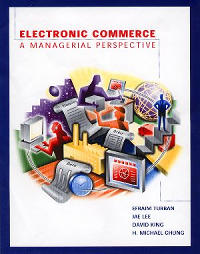
chpt 10, p. 365 Legally binding contracts require 3 parts
Prof. Geist's new book "Internet Law in Canada" has Chapter 10 "Online Contracting" devoted to the topic Geist introduces the chapter
by explaining an important point
Geist understands well the
problems online and points out that
|
PricewaterhouseCoopers"The biggest risk for organisations is believing that m-business opportunities are two to three years away. The pace with which businesses accept emerging technologies is accelerating. M-business is here today, and growing at a tremendous rate. "
| Handheld
devices and their role in the development of m-commerce |
|
.
In
an attempt to give us a snapshot approach to understanding the whole picture
of wireless business and m-commerce, we will employ the results of a class
assignment, April 2001. In this assignment, the class was divided into
2 groups. Each group was charged with creating a point form summary of
all the concepts and "critical understandings" that would be necessary
to have in order to deal with the new issues in wireless business and m-commerce.
The emphasis is on "summary" and the team members were reminded that the
purpose was not to describe in detail all the topics, but rather organize
and categorize an abbreviated list of the topics and put the topics in
an order which would make viewing of it, understandable and educational.
The
results are below. The teams had two different approaches to this task.
Both results are useful to look at as a summary of wireless business and
m-commerce.
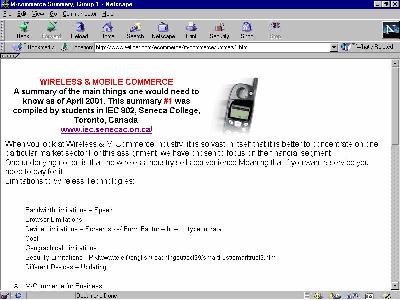 |
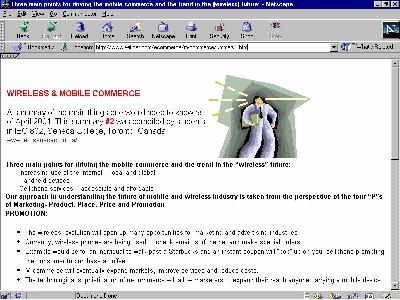 |
.
.
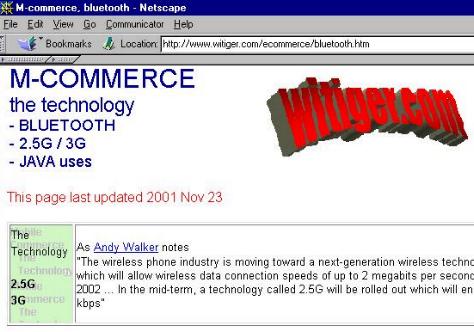
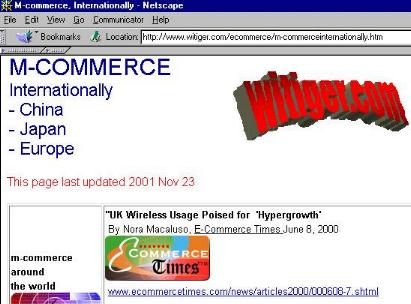
| Internet
needs space to grow Internet
Internet
|
"Ubiquitous Internet needs
space to grow"
Mr. Hamilton writes a long
article about the consequences of running out of IP addresses as more and
more devices and facilities are connected to the internet. He begins the
article by explaining the wide range of appliances and technologies that
could be connected tot he Net, which would require IP addresses in order
to be "contacted" and given commands.
"It's 2020 and, like electricity and running water, the Internet has come to power, and flows through every aspect of your life. Your personal computer and mobile phone aren't the only devices connected to the World Wide Web. Your microwave now surfs for recipes based on the ingredients in your cupboards. Your grocery orders are automatically placed online as food and drinks are taken from your fridge. Your dishwasher, before turning itself on, negotiates the cheapest energy rate for the day, thanks to a software agent known as a hydrobroker. Minivans. Air conditioners. Picture frames. Digital books. MP3 players. Palm computers. BlackBerry pagers. Smart cards. Pop machines. Motor boats.... They will all have a 24-hour, always-on connection to the Internet one day and, like the devices I mentioned above, they will all require Internet Protocol or IP addresses to identify them as unique online ``beings.'' Many experts suggest that the average person will need more than 100 IP addresses for his or her own use within the next 20 years. Herein lies the problem. The Internet, as it exists today, can't support 600 billion IP addresses. If we're lucky, it's capable of assigning 4.3 billion addresses. And if that's the case, we've already used up more than 60 per cent of the capacity, meaning we'll likely run out within the next few years. Can anybody say crisis? If you thought the Y2K bug threat was a major headache, then get ready for a migraine." |
| Internet
needs space to grow |
Latif Ladid,
president of the IPv6 Forum, has a powerpoint presentation on the IPv6
website which you are encouraged to have a look at the first few slides.
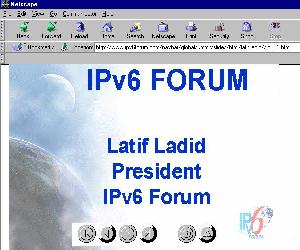 |
| Internet
needs space to grow Internet
|
http://www.zdnet.com/intweek/stories/news/0,4164,2349342,00.html McGarvey explains, "The major shortcoming of the current version of IP, IPv4, is that it is running out of available IP addresses. Designed when the Internet was still a data-sharing network for research facilities and the military, IPv4 was given a 32-bit addressing scheme, which was capable of assigning a few billion unique addresses. IPv6, on the other hand, is beefed up with a 128-bit addressing scheme, which enables it to spawn many more billions of additional addresses." McGarvey notes the first
meeting of the IPv6 Forum, an international advocacy group dedicated to
advancing the next generation of the Internet Protocol (IP), was held in
Paris in October 1999.
|
|
|
CONTACT IMAIN PAGE I NEWS GALLERY I E-BIZ SHORTCUTS I INT'L BIZ SHORTCUTS I MKTG&BUSINESS SHORTCUTS I TEACHING SCHEDULE |
| . | |
| MISTAKES I TEXTS USED I IMAGES I RANK I FORMER STUDENTS I | |
| . |